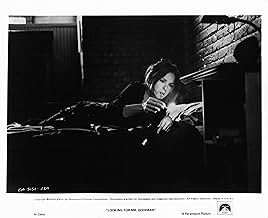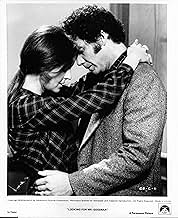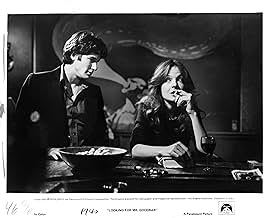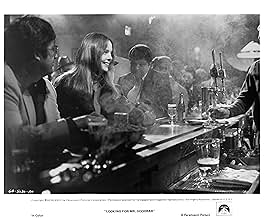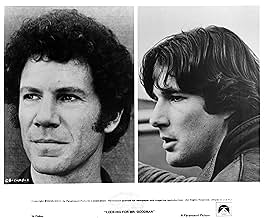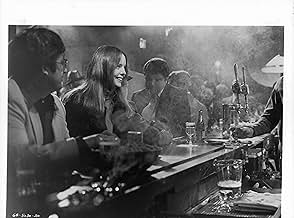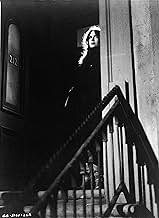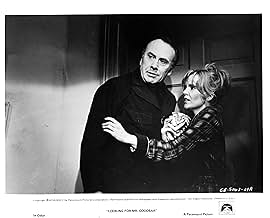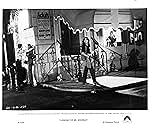IMDb RATING
6.7/10
9.4K
YOUR RATING
Dedicated schoolteacher Theresa Dunn spends her nights cruising bars, looking for males with whom she can engage in progressively dangerous extreme sexual encounters.Dedicated schoolteacher Theresa Dunn spends her nights cruising bars, looking for males with whom she can engage in progressively dangerous extreme sexual encounters.Dedicated schoolteacher Theresa Dunn spends her nights cruising bars, looking for males with whom she can engage in progressively dangerous extreme sexual encounters.
- Nominated for 2 Oscars
- 1 win & 6 nominations total
- Director
- Writers
- All cast & crew
- Production, box office & more at IMDbPro
Featured reviews
Looking for Mr. Goodbar is directed by Richard Brooks and Brooks adapts the screenplay from the Judith Rossner novel of the same name. It stars Diane Keaton, Tuesday Weld, William Atherton, Richard Kiley, Richard Gere, Alan Feinstein and Tom Berenger. Music is by Artie Kane and cinematography by William A. Fraker.
Theresa Dunn (Keaton) is a dedicated schoolteacher to deaf children by day, but at night she cruises bars looking for abusive men with whom she can engage in progressively violent sexual encounters.
First off it should be noted that the Judith Rosner novel is based on the real life case of the 1973 murder of New York City schoolteacher Roseann Quinn. Also of note is that Rossner was not enamoured with this filmic adaptation.
What we have here is a tragic tale set in the promiscuous pre AIDS era of 1970s America. It's a bleak observation of the swinging singles scene of the era, providing caution of patriarch pressures, religious suffocation and the dangers of casual encounters for sexual gratification. Is it any wonder the big hitting critics of the time were nonplussed by it?...
The pic generated a lot of buzz for handsome new actor, Richard Gere, even if he does overact, it actually works in context to the brashness of the period. It also introduced Tom Berenger, in what is a frightening portrayal of a very sexually confused man. Tuesday Weld got a Best Supporting Actress Oscar nomination for playing Theresa's sister, which was richly deserved, so much so one wishes she was in the film more.
Yet it's Keaton who absolutely shines here, lifting an overlong picture to greater heights. Proving she had more in her armoury than merely playing kooks, Keaton imbues Theresa with a desperation and loneliness that is shattering for viewing purpose. The whole narrative bites with a crushing inevitability, that the nihilistic back drop can only bring pain and misery, and so it proves.
Richard Brooks should have sliced at lest thirty minutes from the run time, especially given that the "Theresa fantasy sequences" just come off as pointless and take one out of the heartbeat of the story. Yet this is still a fine movie, not one to be cheered up by of course, but poignant, relative and with the real life story at the core, important. 7/10
Theresa Dunn (Keaton) is a dedicated schoolteacher to deaf children by day, but at night she cruises bars looking for abusive men with whom she can engage in progressively violent sexual encounters.
First off it should be noted that the Judith Rosner novel is based on the real life case of the 1973 murder of New York City schoolteacher Roseann Quinn. Also of note is that Rossner was not enamoured with this filmic adaptation.
What we have here is a tragic tale set in the promiscuous pre AIDS era of 1970s America. It's a bleak observation of the swinging singles scene of the era, providing caution of patriarch pressures, religious suffocation and the dangers of casual encounters for sexual gratification. Is it any wonder the big hitting critics of the time were nonplussed by it?...
The pic generated a lot of buzz for handsome new actor, Richard Gere, even if he does overact, it actually works in context to the brashness of the period. It also introduced Tom Berenger, in what is a frightening portrayal of a very sexually confused man. Tuesday Weld got a Best Supporting Actress Oscar nomination for playing Theresa's sister, which was richly deserved, so much so one wishes she was in the film more.
Yet it's Keaton who absolutely shines here, lifting an overlong picture to greater heights. Proving she had more in her armoury than merely playing kooks, Keaton imbues Theresa with a desperation and loneliness that is shattering for viewing purpose. The whole narrative bites with a crushing inevitability, that the nihilistic back drop can only bring pain and misery, and so it proves.
Richard Brooks should have sliced at lest thirty minutes from the run time, especially given that the "Theresa fantasy sequences" just come off as pointless and take one out of the heartbeat of the story. Yet this is still a fine movie, not one to be cheered up by of course, but poignant, relative and with the real life story at the core, important. 7/10
Will they PLEASE release this on DVD! As of now, it's only available on PAN/SCAN VHS. ....Diane Keaton reinvents herself, going astray from her Annie Hall persona. Her character is complex and it's entertaining to watch her evolve or de-evolve. The mood is classic gritty 70's. Sometimes funny, sometimes sexy, sometimes bleak. ...The ending is of course what will stick with you forever. It's hard to tell what director Richard Brooks wanted to say with this, but none the less, it's a good ride. Highly recommended. Apparently it created quite a stir when it came out, and even today, critics like Leonard Maltin still bring it down saying it's lewd and pointless. You be the judge. Like it or not it's still a good period piece, showing the seedier side of one young woman's life in the city. I can't wait to get this and watch it again -- if the studio ever gets the nerve to release it. I give it a good 9/10.
The movie really gets the whole 1970s drug sniffing, gay liberation, pro swinger pre aids lifestyle down, and then closes with what may be one of the most depressing endings ever shot for a movie. As we all know, Diane Keaton is the straight laced teacher by day, and bar hopper by night. Her Catholic background and domineering father all contribute to her rampant promiscuity, and she ends up paying for it in the end. Sad, because the sexual revolution of the time gave women the right to do what she does in the film without being called whores, and then she had to pay for it. Such a good flick though, although it could have used a little editing for time. See it, and decide for yourself. Highly recommended, and perfect depiction of a life that really is impossible to imagine in this day and age.
It was searching for a copy of this that led me to a source of otherwise unavailable films but the lengthy running time has put me off watching it, for some time. Also, I cannot now remember what got me intrigued by the title anyway. In any event the thing is now watched. It seems to me there is a bit too much of everything here, certainly Richard Gere and Tuesday Weld who are well over the top. Keaton is fine but her character begins to irritate halfway through, what with all her neediness and simultaneously thrusting of people aside, her wonderfully virtuous deaf classes, adding nothing whatsoever and the growing tedium of the shadowy scenes of sex and drugs. Brave of Keaton to take the role but if only Brooks could have kept it to something more like 90 minutes we would surely have had a much more succinct and effective movie. Too many characters to little effect and too many downers and not enough uppers.
This was an interesting movie and it shows how the world has changed in the last 30 years. The attitudes (between men and women, gays and straights), the language used back then, the social atmosphere (bar scene) of the late 1970s, even the financial differences--she's able to afford an apartment in Manhattan on a teachers salary! (even though it has roaches this still isn't possible in 2006). All of these things made the movie interesting for me. I also imagine it must have been a very shocking movie back then. I was 8 years old when it came out so I didn't see it in the theater but I would have liked to see it in a theater just to see how people took it back then. I would have liked to walk out of the theater and hear the conversations going on as people walked to their cars. Did people like it back then? Did they think it was shocking? Did they think it accurately portrayed a type of person they maybe knew or were themselves back then? Also, Diane Keaton was very good in it and it's very interesting to see a young Richard Gere and Tom Berenger when their careers were just beginning.
Did you know
- TriviaTom Berenger admitted in an interview that he had nightmares after he was finished shooting all of his scenes as Gary.
- GoofsTheresa is supposed to be a first-grade teacher, but all her students look to be way older. The youngest seem to be 9 or 10 while the oldest could be 12, 13 or even older.
- Crazy creditsThe Paramount logo is shortened at both ends, fading in at the point the text already appears. It was gray-scaled in the closing version.
- ConnectionsFeatured in Sex, Censorship and the Silver Screen: Forward Into the Past (1996)
- SoundtracksTry Me, I Know We Can Make It
Written by Donna Summer (uncredited), Giorgio Moroder (uncredited) and Pete Bellotte (uncredited)
Performed by Donna Summer
Courtesy of Casablanca Record & FilmWorks
- How long is Looking for Mr. Goodbar?Powered by Alexa
Details
Box office
- Gross US & Canada
- $22,512,655
- Opening weekend US & Canada
- $1,540,635
- Oct 23, 1977
- Gross worldwide
- $22,513,584
- Runtime
- 2h 16m(136 min)
- Sound mix
- Aspect ratio
- 1.85 : 1
Contribute to this page
Suggest an edit or add missing content


